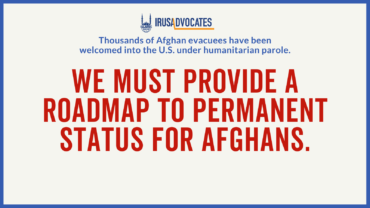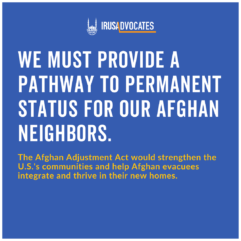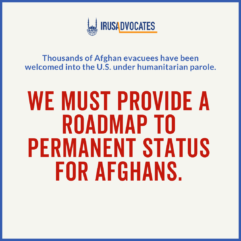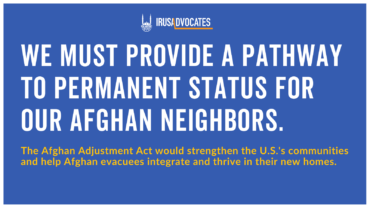Afghan Adjustment Act Factsheet
Following the chaotic U.S. military withdrawal from Afghanistan, tens of thousands of U.S.-affiliated and at-risk Afghans have been or will soon be welcomed into the United States via humanitarian parole. The Department of Homeland Security (DHS) has the authority to use this process to allow people outside the United States to enter for humanitarian reasons, but it is typically only granted for 1 or 2 years to provide safety for people under threat. Unlike immigrant visa or refugee programs, humanitarian parole is not a pathway to permanent status; it is a temporary allowance to enter and remain in the United States. As such, Afghans who have been or will enter the U.S. with humanitarian parole under Operation Allies Welcome find themselves under a cloud of legal uncertainty, and in a worse position in terms of immigration status than had they entered as Special Immigrant Visa holders (SIVs) or refugees through the U.S. Refugee Admissions Program (USRAP).
The Afghan Adjustment Act, patterned after similar legislation such as the Cuban Adjustment Act following the Cuban Revolution, offers an important correction by allowing these Afghan refugees to apply for lawful permanent resident status, the same legal status they would have received had they been admitted as refugees. Rather than punishing Afghan arrivals for being evacuated, Congress has an urgent obligation to ensure they have a chance to become lawful permanent residents.
The Afghan Adjustment Act would provide a roadmap to permanent status for Afghans on humanitarian parole after one year.
As thousands of at-risk and U.S.-affiliated Afghans currently remain outside the United States, whether in Afghanistan or in third countries, our recommended adjustment legislation would cover at-risk Afghans who are paroled into the United States between July 1, 2021 and July 1, 2025.
Many of the Afghans are or would have been eligible for processing through the SIV program, which grants visa-holders immediate lawful permanent resident (LPR/green card) status on arrival. Virtually all of the Afghans arriving via humanitarian parole meet the legal definition of a refugee and, had they been admitted through USRAP, they would have been eligible to adjust to LPR status after one year.
Our legislation also grants the administration discretion to ensure that Afghans seeking safety are not arbitrarily barred from protection due to existing law that fails to consider the perilous journeys that they were forced to take to arrive in the United States. This discretionary waiver authority is necessary. Current law does not appropriately reckon with the fact that the Taliban is the de facto government of Afghanistan, and this creates a high likelihood that Afghan allies, human rights defenders, and other at-risk Afghans could be barred from permanent status for arbitrary or wrongful reasons that have no bearing on national security.
This possibility is not theoretical. The State Department has previously determined, and the Supreme Court has upheld, that merely working in any capacity (including clerks and school teachers) under the Taliban government was sufficient cause to bar a visa applicant. U.S. courts have held that being forced under duress to feed Taliban members is sufficient to justify a bar. The Taliban was actively harassing and threatening people approaching the airport in Kabul leading up to the evacuation, and this waiver authority is vital to ensure that something as minor as being the victim of a Taliban checkpoint shakedown does not prevent Afghan parolees from permanent status.
In short, the effect and purpose of this legislation is to put our new Afghan neighbors on the same legal footing they would have enjoyed had they been admitted through the U.S. resettlement program, rather than through the chaotic and dangerous Kabul evacuation. After a harrowing and life-threatening experience saving themselves and their families from violence, they should not be further traumatized by an immigration system that simply was not adequately prepared for their arrival.
The Alternative: if Congress fails to act, it will place tremendous additional strain on already-overwhelmed asylum and immigration court systems.
Without an Afghan Adjustment Act, these tens of thousands of recently arrived Afghans will have to find an existing immigration pathway in order to remain in lawful status once their parole expires. In all likelihood, that will mean tens of thousands of new asylum claims. Given what the whole world knows about the worsening persecution in Afghanistan, putting our new Afghan neighbors through the asylum process is a needless waste of precious time and resources, not to mention additional trauma for people who have only recently escaped Afghanistan with their lives.
The current affirmative asylum backlog is more than 400,000 cases with a broader immigration backlog of 1.4 million cases. Further, many of these Afghans arrived with little more than the clothes on their backs. Many were forced to destroy important documentation in order to avoid Taliban violence while waiting to be evacuated. Many more had important documentation destroyed by the U.S. Embassy in Kabul as the city fell. Such complications could make asylum claims more difficult and increase the likelihood that Afghan parolees will end up in already-overwhelmed immigration courts.
The bottom line is that the Afghan Adjustment Act is desperately needed to provide fundamental fairness to Afghan neighbors who have just escaped a deadly situation. The administration’s moral obligations further require avoiding years of needless asylum processing for tens of thousands of people whose risk of return is otherwise in doubt. It would further save precious government resources and avoid any unintended harm to the hundreds of thousands of already-existing asylum seekers that could be caused by dropping this new group into the same pipeline. Congress must act now to pass an Afghan Adjustment Act.



